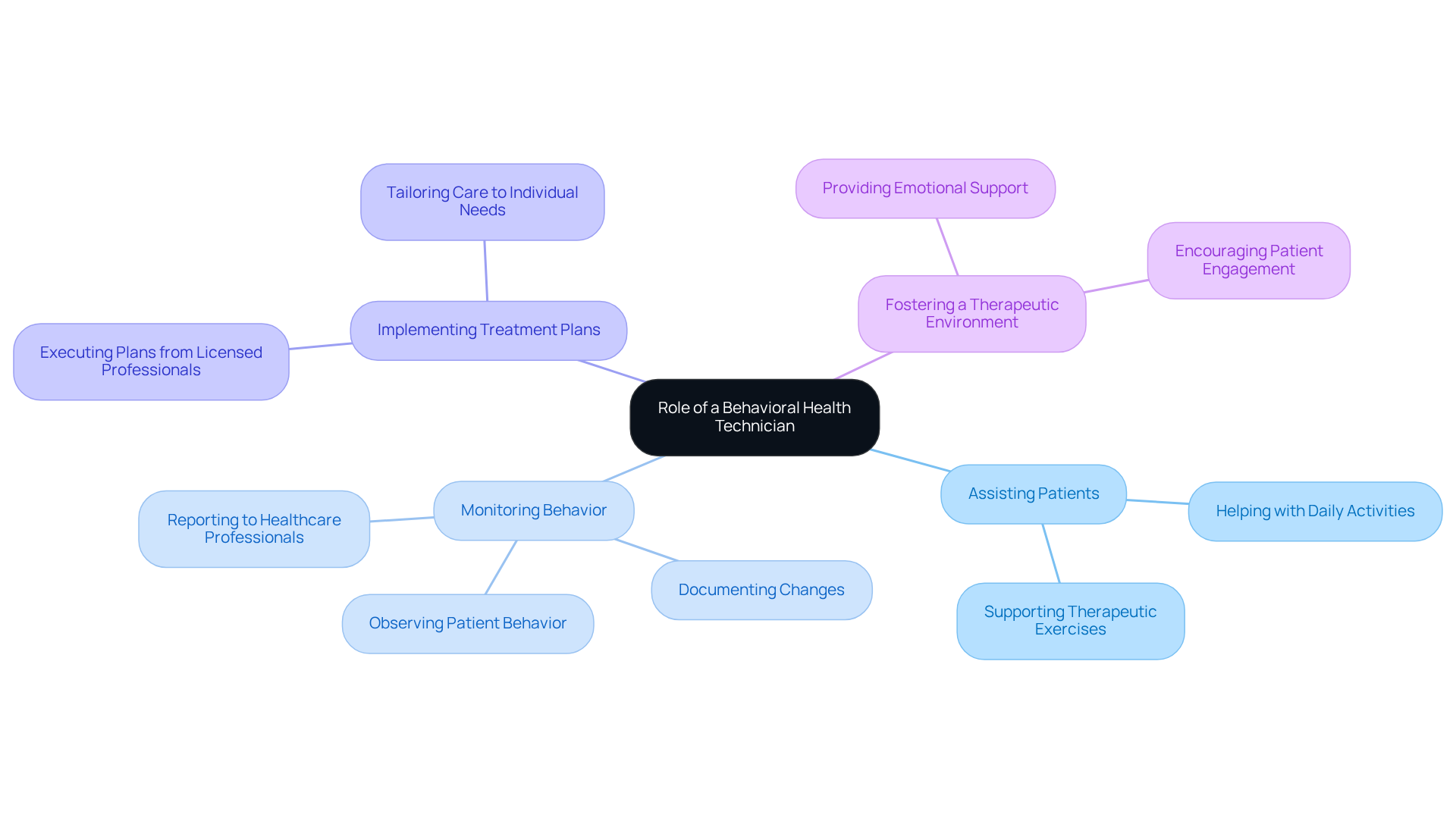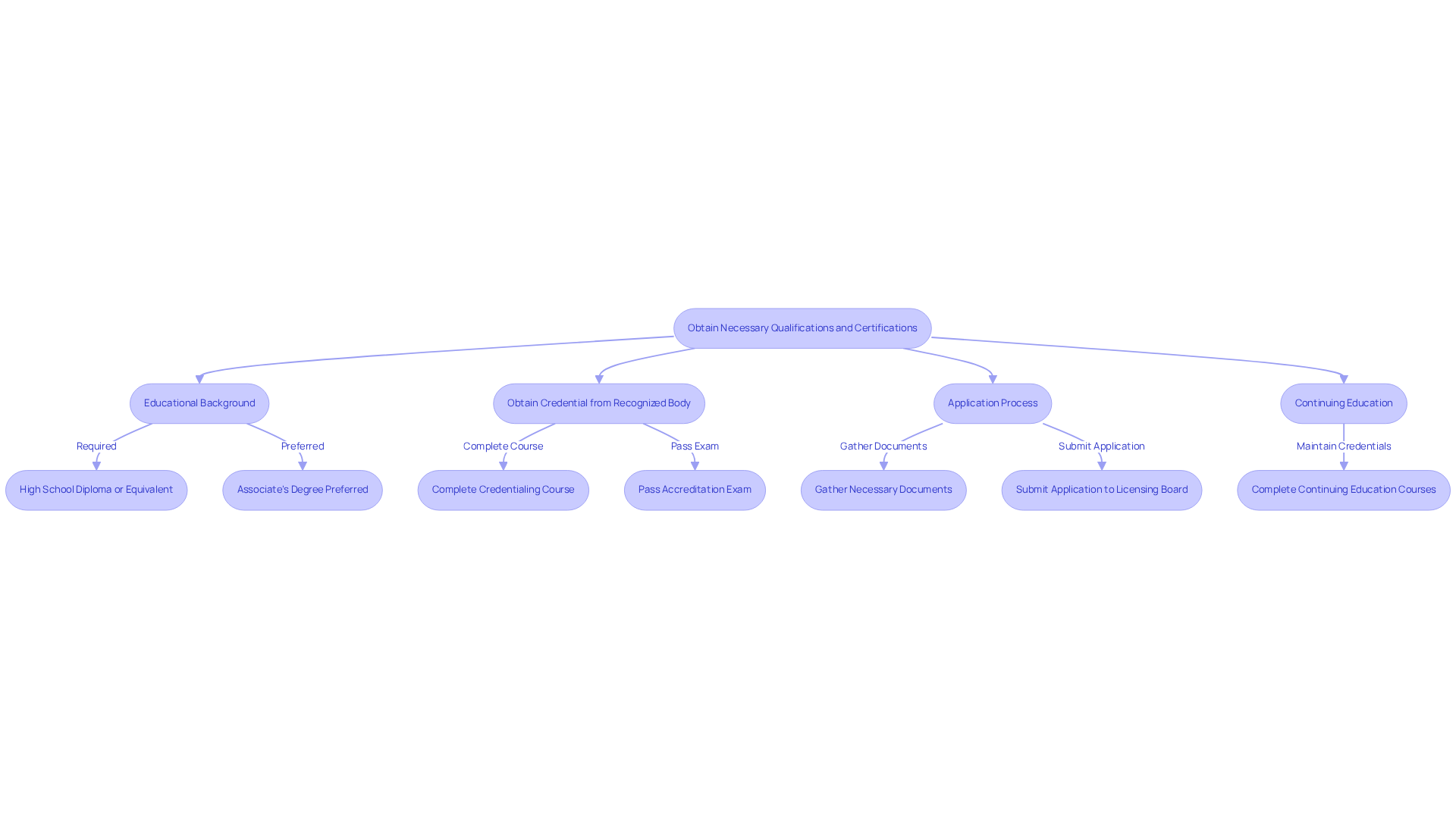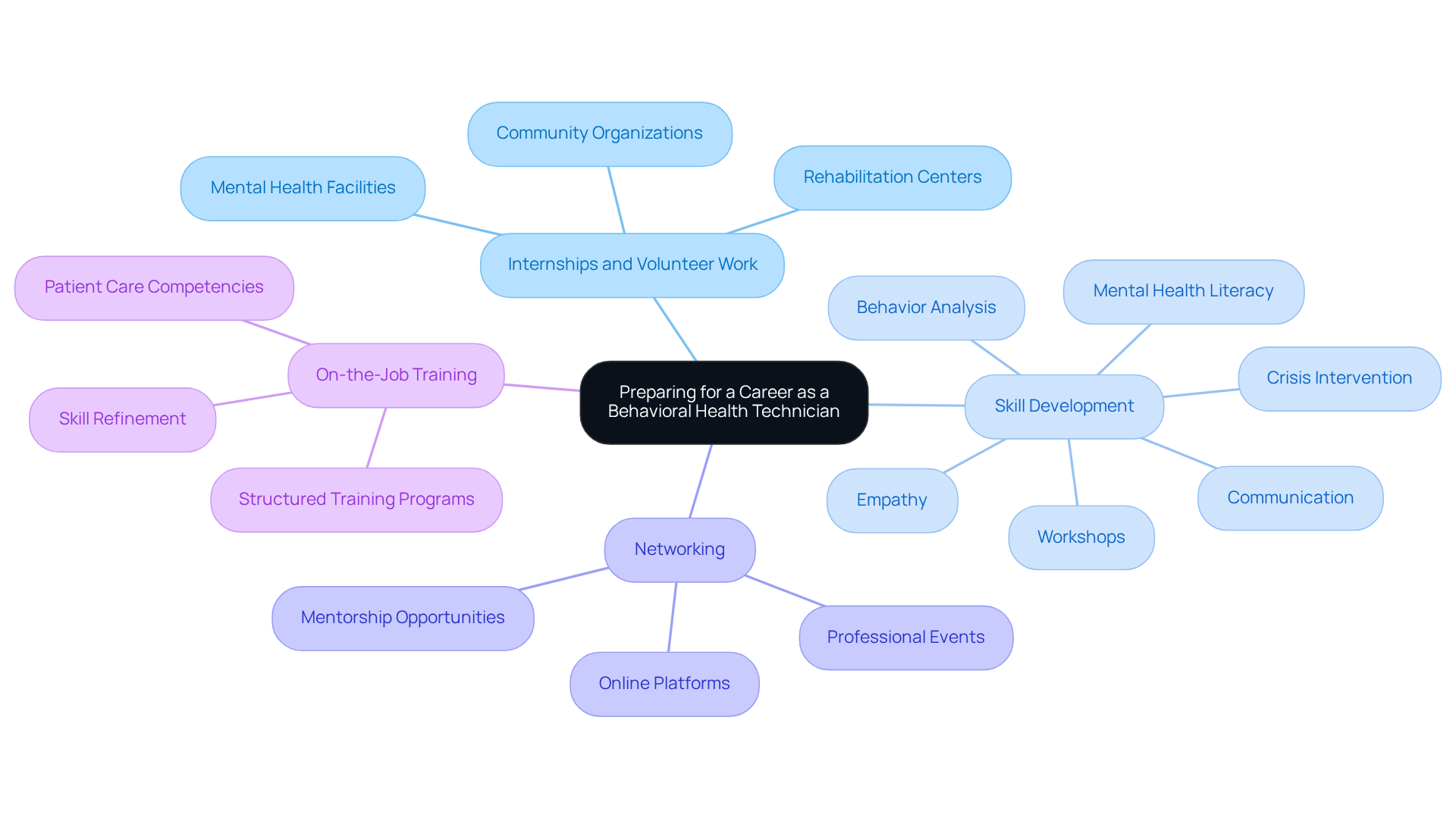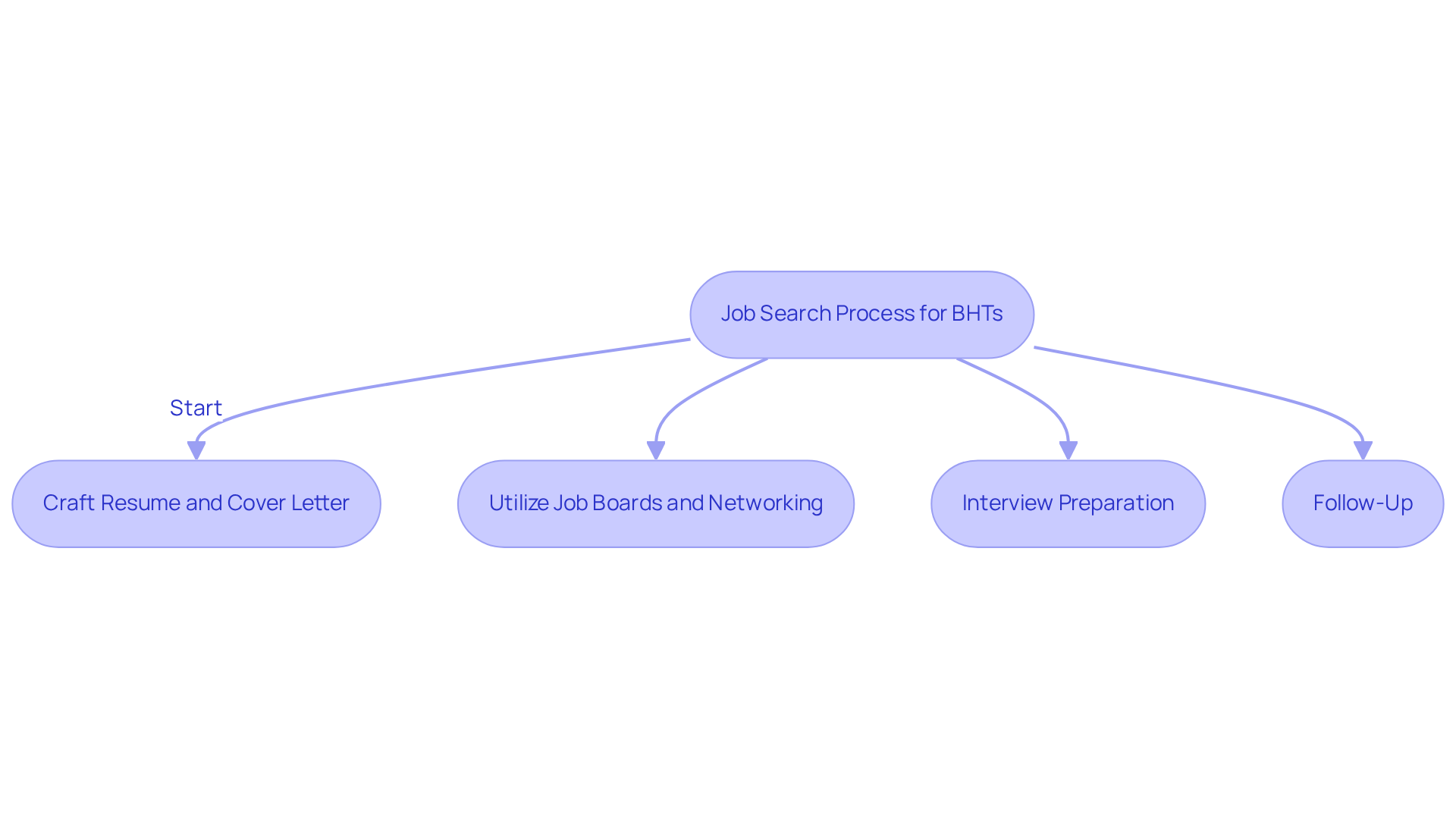September 8, 2025

The article presents a compelling step-by-step guide for individuals aspiring to become certified behavioral health technicians (BHTs), highlighting the essential qualifications, skills, and effective job search strategies necessary for success in this field.
With the demand for BHTs on the rise, it is crucial to understand their key responsibilities and the significance of obtaining formal certification. Moreover, the article underscores the value of relevant experience and strategic networking, which can significantly enhance career prospects in this vital healthcare sector.
The escalating demand for mental health support has illuminated the pivotal role of certified behavioral health technicians (BHTs) within the healthcare system. These professionals not only provide essential care to individuals struggling with mental health and substance use disorders but also play a significant part in improving recovery outcomes. Yet, aspiring BHTs may find themselves questioning:
This guide serves as a comprehensive roadmap for those seeking to become certified behavioral health technicians, outlining the qualifications, skills, and strategies essential for success in this crucial field.
Certified behavioral health technicians (BHTs) play an indispensable role in supporting individuals facing mental health and substance use disorders. With over 47,666 BHTs employed across the United States in 2025, the is evident. Their primary responsibilities encompass a range of critical tasks:
Furthermore, approximately 21,200 job openings for psychiatric technicians and aides are projected each year, underscoring the need for qualified professionals in this field. Successful programs involving certified behavioral health technicians have shown a positive impact on patient care, enhancing recovery outcomes through dedicated support and monitoring. Mental health experts emphasize that the role of the certified behavioral health technician (BHT) is essential to the healthcare team, as they not only assist in daily care but also contribute significantly to the overall therapeutic process. As Chris Foy, Content Manager at FHE Wellness, states, "It takes a special person to become a behavioral health technician." Understanding these responsibilities is crucial for aspiring certified behavioral health technicians, as it aligns their skills and interests with the demands of this rewarding career.

Candidates must fulfill specific educational and certification requirements to become a [certified behavioral health technician](https://hireaba.today). The demand for certified behavioral health technicians is on the rise, making this an opportune time to pursue certification.
Educational Background: A high school diploma or equivalent is typically required, although many employers prefer candidates with an associate's degree in a related field. Educational programs often include both theoretical knowledge and practical training, effectively preparing individuals for the demands of the role.
Qualification: Candidates must obtain a credential from a recognized body, such as the Florida Certification Board (FCB) or similar organizations in their state. This process typically entails finishing a credentialing course, which may consist of at least 480 hours of college coursework and pertinent work experience, succeeded by passing an accreditation exam. As of 2025, approximately 30% of Behavioral Health Technicians possess credentials, reflecting a growing acknowledgment of the significance of formal qualifications in improving career opportunities and ensuring high standards of patient care.
Application Process: Applicants should gather necessary documents, including proof of education and any required work experience. Submitting a complete application to the appropriate licensing board is essential for approval.
Continuing Education: To maintain credentials, many states require BHTs to complete continuing education courses. This ongoing education ensures that professionals remain updated on best practices and industry standards, which is crucial in a rapidly evolving field. The dedication to ongoing education is essential, as it not only aids in upholding credentials but also improves the quality of care delivered to patients.
In the context of the job market, the median salary for psychiatric technicians was $35,030 in 2020, with job growth projected at 13% from 2020 to 2030. This data underscores the as a certified behavioral health technician and pursuing educational qualifications to remain competitive in the field. Are you ready to take the next step in your career? Consider the advantages of becoming a certified behavioral health technician today.

To effectively prepare for a career as a Behavioral Health Technician, gaining relevant experience and skills is crucial. The demand for qualified professionals in this field is growing, making it essential to stand out.
Essential Skills for 2025: As the demand for certified behavioral health technicians continues to grow, key skills such as behavior analysis, mental wellness awareness, and effective communication will be increasingly sought after by employers. Staying updated on industry trends and continuously enhancing your skill set will position you favorably in the job market. As noted by Nicholas Procter et al., mental health clinicians need to address stigma and promote health, which highlights the importance of these skills in the field.
By actively pursuing these avenues, aspiring Behavioral Wellness Technicians can build a robust foundation for a successful career in this vital field.

Successfully navigating the job search process for Behavioral Health Technicians (BHTs) requires a strategic approach. Did you know that job seekers typically submit an average of 10 to 15 job applications during their search? This statistic reflects the competitive nature of the field and underscores the importance of a .
Resume and Cover Letter: Begin by crafting a professional resume and cover letter tailored specifically to the BHT role. Highlight your relevant experience, skills, and certifications. Ensure that your documents reflect the competencies prioritized by hiring managers. As one hiring manager noted, "A well-structured resume that clearly outlines relevant experience can make a significant difference in a candidate's chances."
Job Boards and Networking: Utilize job boards, such as Hire ABA, to discover job openings. Additionally, leverage your professional network to uncover unadvertised positions, as many BHT roles are filled through referrals rather than traditional listings. Are you tapping into your network effectively?
Interview Preparation: Prepare for interviews by researching common questions and practicing your responses. Be ready to discuss your experience in direct patient care and how it aligns with the responsibilities of a BHT, as this is often a focal point for hiring managers.
Follow-Up: After interviews, send thank-you notes to express appreciation for the opportunity. This simple gesture can leave a lasting positive impression and keep you top of mind for hiring managers, who often appreciate candidates who demonstrate professionalism and gratitude.
In addition to these steps, it's important to note that the median annual wage for psychiatric technicians was $42,590 in May 2024, and BHTs must complete an approved training course before taking examinations. By following these steps, candidates can significantly enhance their chances of securing a position in this growing sector. Take action today and leverage these strategies to stand out in your job search.

Becoming a certified behavioral health technician (BHT) is not just a career choice; it is a fulfilling journey that plays a crucial role in addressing the growing demand for professionals in this vital field. The opportunity to make a significant impact on individuals struggling with mental health and substance use disorders is immense, positioning BHTs at the forefront of an industry that is experiencing rapid growth.
This guide has highlighted key aspects of the BHT role, including essential responsibilities, educational and certification requirements, and the importance of relevant experience. BHTs assist patients, monitor behaviors, implement treatment plans, and foster therapeutic environments, making them integral to the recovery process. Furthermore, ongoing education and skill development are critical for maintaining high standards of care and ensuring competitiveness in the job market.
As the demand for certified behavioral health technicians continues to rise, aspiring professionals must take proactive steps toward certification and skill enhancement. Engaging in internships, networking within the industry, and preparing thoroughly for the job search are essential actions that can lead to a successful and rewarding career. By committing to this path, individuals not only contribute to the well-being of others but also secure a fulfilling role in a rapidly evolving field that values compassion and expertise.
What is the role of a Certified Behavioral Health Technician (BHT)?
Certified Behavioral Health Technicians (BHTs) support individuals facing mental health and substance use disorders by assisting patients with daily activities, monitoring behavior, implementing treatment plans, and fostering a therapeutic environment.
How many BHTs are employed in the United States?
As of 2025, there are over 47,666 Certified Behavioral Health Technicians employed across the United States.
What are the primary responsibilities of a BHT?
The primary responsibilities of a BHT include assisting patients with daily activities, monitoring and documenting patient behavior, implementing treatment plans, and providing emotional support to foster a therapeutic environment.
What is the projected job outlook for psychiatric technicians and aides?
Approximately 21,200 job openings for psychiatric technicians and aides are projected each year, indicating a strong demand for qualified professionals in this field.
How do BHTs impact patient care and recovery outcomes?
Successful programs involving BHTs have shown a positive impact on patient care by enhancing recovery outcomes through dedicated support and monitoring.
Why is the role of a BHT considered essential in the healthcare team?
The role of a BHT is essential because they assist in daily care and contribute significantly to the overall therapeutic process, making them a vital part of the healthcare team.
What qualities are important for someone to become a BHT?
It takes a special person to become a BHT, as they need to possess qualities that align with the demands of supporting individuals with mental health and substance use disorders.
Our expert recruitment strategies and AI-driven sourcing ensure that you receive top-notch candidates quickly, without compromising on quality. Whether you’re looking for BCBAs, Clinical Directors, or RBTs, we’ve got you covered.